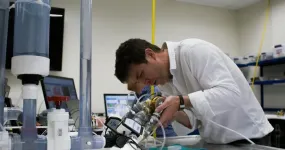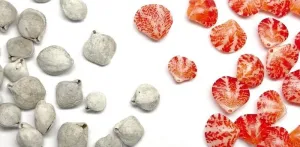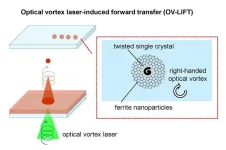(Press-News.org) Scientists have known from ice core research that it's easier to melt an ice sheet than to freeze it up again. Now, they know at least part of the reason why, and it has to do with ice's "sponginess," according to a new study published July 24 in The Cryosphere.
The study uses a physics-based numerical model to assess the impacts of warming and cooling on firn, the porous layer between snow and glacial ice, over the entire Greenland Ice Sheet. Megan Thompson-Munson, a CIRES and ATOC PhD student, led the study alongside her advisors: CIRES Fellow Jen Kay and INSTAAR Fellow Brad Markle.
"The amount of change that occurs within the firn layer due to warming and cooling is not equal in magnitude,” Megan Thompson-Munson said. “If we look at thousands or millions of years, we see asymmetric ice sheet behavior overall: Ice sheets can melt away quickly, but take a long time to grow. This firn asymmetry we identify is a small piece of that puzzle."
Firn covers about 90 percent of the Greenland Ice Sheet, located at higher elevations where, along with snow, it covers hundreds of meters of ice and acts as a buffer against sea level rise—making it integral to preserving Arctic glaciers in a warming climate. Firn is porous and spongy, which allows water to pass through on its way to the solid ice layer below, where it can refreeze, adding to the existing ice sheet instead of flowing to the ocean.
In this study, researchers found warming temperatures are rapidly changing how efficiently firn can store meltwater, and cooling temperatures may not help the firn fully recover as much as scientists might have hoped.
"The warming depletes what we call the 'firn air content' or the 'sponginess," Thompson-Munson said. "So you lose more of the sponginess due to warming than can be regained due to cooling. And it's important because this porous firn can buffer the ice sheet's sea level rise contribution."
To understand how firn responds to both warming and cooling temperatures, the team used a physics-based computer model called SNOWPACK, and honed in on one variable: temperature. The study is the first of its kind in two ways. First, researchers looked at the impacts of both warming and cooling temperatures on Greenland firn. Second, the scope of the research covered the entire ice sheet, while previous studies focused on smaller geographical areas.
“The Greenland ice sheet loses mass faster under warming than it gains mass under cooling,” said Kay. “The key advance of this study is that Greenland’s firn contributes to this greater warming-than-cooling asymmetric response.”
Thompson-Munson said the study brings up an important question regarding geoengineering and the ability to reverse our Earth’s warming. Any geoengineering concepts designed to decrease temperatures in the Arctic might not preserve ice and snow as efficiently as imagined; the degree of cooling will have to exceed the degree of warming to help firn and glaciers return to normal.
“To get back to initial conditions, we’d have to cool a lot more or start changing other variables a s well,” Thompson-Munson said. “It’s hard to reverse what we’ve already done.”
END
Warming has more impact than cooling on Greenland's "firn"
2024-07-25
ELSE PRESS RELEASES FROM THIS DATE:
The Texas Heart Institute implants BiVACOR® Total Artificial Heart
2024-07-25
Houston, Texas, July 25, 2024 – The Texas Heart Institute (THI) and BiVACOR®, a clinical-stage medical device company, announced today the successful first-in-human implantation of the BiVACOR Total Artificial Heart (TAH) as part of the U.S. Food and Drug Administration (FDA) Early Feasibility Study (EFS) on July 9, 2024. BiVACOR’s TAH is a titanium-constructed biventricular rotary blood pump with a single moving part that utilizes a magnetically levitated rotor that pumps the blood and replaces both ventricles of a failing heart.
The first-in-human clinical ...
University of Washington researchers take flight with new insights on bat evolution
2024-07-25
University of Washington Researchers Take Flight with New Insights on Bat Evolution
Video Interview with Authors - https://youtu.be/6rogrh2_HN0
In new research published in PeerJ Life & Environment, researchers from the University of Washington, University of Texas at Austin and Oregon Institute of Technology, led by undergraduate student Abby Burtner, have advanced our understanding of the evolutionary origins of flight in bats. The study, titled "Gliding toward an Understanding of the Origin of Flight in Bats," employs phylogenetic comparative methods to explore the evolutionary transition from gliding to powered flight in these unique mammals.
Bats ...
Tanzanian officials praise NEST360 contribution to newborn care
2024-07-25
HOUSTON – (June 25, 2024) – Rice University President Reginald DesRoches joined Rice360 Institute for Global Health Technologies Co-Director Maria Oden and Rice360 supporters on a trip to Africa this summer marking significant milestones on the road to ending preventable newborn deaths in the sub-Saharan region. Rice360 is one of 22 organizations in the Newborn Essential Solutions and Technologies (NEST360) international alliance, and this trip signified Rice’s continued collaboration ...
4D Medicine raises £3.4 million for unique biomaterial platform
2024-07-25
4D Medicine, a spin-out from the Universities of Birmingham and Warwick has raised £3.4m ($4.4m) in a Series A investment.
The funding round was backed by Oshen Holdings, DSW Ventures, SFC Capital, Boundary Capital and private investors including several leading scientists and surgeons. It will enable the company to complete pre-clinical testing of its first product range and seek FDA clearance for entry into the US market.
4D is a UK-based company whose innovative biomaterial has potential to be used for a wide range of 3D printed implants and surgical devices. Its product 4Degra is a resorbable biomaterial that is being used to develop ...
Ancient marine animal had inventive past despite being represented by few species, new study finds
2024-07-25
The findings, published today in Nature Ecology & Evolution, sheds light on some core principles of the evolution of modern biodiversity.
In current oceans, molluscs such as clams, oysters, and snails are hugely diverse, with over 50,000 species, whereas brachiopods are rare by comparison with only 394 species known. But this was not always the case. The team have found that brachiopods were evolving new shell shapes and ecological behaviours following the end-Permian mass extinction which compromised their numbers.
“In the Palaeozoic, from 540 to 250 million years ago, brachiopods ruled the seabed,” ...
Quantum sensor for the atomic world developed through international scientific collaboration
2024-07-25
In a scientific breakthrough, an international research team from Germany's Forschungszentrum Jülich and Korea's IBS Center for Quantum Nanoscience (QNS) developed a quantum sensor capable of detecting minute magnetic fields at the atomic length scale. This pioneering work realizes a long-held dream of scientists: an MRI-like tool for quantum materials.
The research team utilized the expertise of bottom up single-molecule fabrication from the Jülich group while conducting experiments at QNS, utilizing the Korean team’s leading-edge ...
The research was wrong: study shows moderate drinking won’t lengthen your life
2024-07-25
PISCATAWAY, NJ – Probably everyone has heard the conventional wisdom that a glass of wine a day is good for you--or you’ve heard some variation of it. The problem is that it’s based on flawed scientific research, according to a new report in the Journal of Studies on Alcohol and Drugs.
Over the years, many studies have suggested that moderate drinkers enjoy longer lives with lower risks of heart disease and other chronic ills than abstainers do. That spurred the widespread belief that alcohol, in moderation, can be a health tonic. However, not all studies have painted such a rosy picture--and the ...
Save your data on printable magnetic devices? New laser technique’s twist might make this reality
2024-07-25
The proliferation of all things digital doesn’t mean that printing technology is no longer relevant. In fact, printing technology is required to make the semiconductors necessary for the digital world. And as an Osaka Metropolitan University-led team has shown using a new printing technique, printable magnetic devices for high-density data storage might soon be realized.
Dr. Ken-ichi Yuyama, a lecturer at the Graduate School of Science, and his colleagues report in APL Materials on the development of a new type of laser-induced forward transfer ...
Early onset dementia more common than previously reported – the incidence of Alzheimer’s disease seems to be on the rise
2024-07-25
A new major study by the University of Eastern Finland, the University of Oulu and Neurocenter Finland explored early-onset dementia in the working-age population in Finland. The study cohort was one of the largest in the world to date, and the findings were published on 24th of July 2024 in Neurology®, the medical journal of the American Academy of Neurology.
Current epidemiological data on early-onset dementia is scarce and based on small study cohorts, with no recent data from Finland available. For the present ...
Pesticides potentially as bad as smoking for increased risk in certain cancers
2024-07-25
In modern day agriculture, pesticides are essential to ensure high enough crop yields and food security. These chemicals, however, can adversely affect plant and animal life as well as the people exposed to them.
Now, in a population-based, nation-wide study, researchers in the US have put increased cancer risk through agricultural pesticide use into context with smoking, a better understood cancer risk factor. The results were published in Frontiers in Cancer Control and Society.
“In our study we found that for some cancers, the effect of agricultural pesticide usage is comparable in magnitude to the effect of smoking,” said the study’s ...









